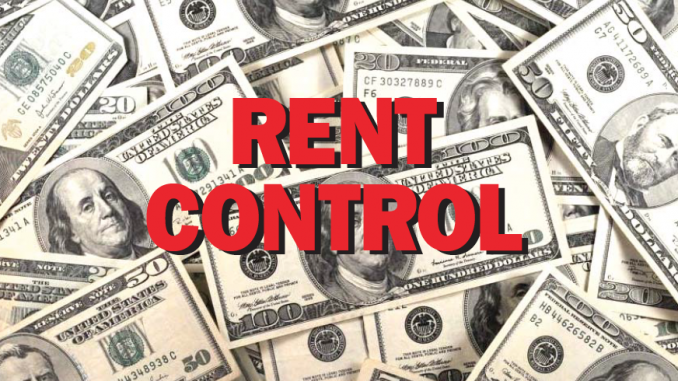
BY ELAINE GOODMAN
Daily Post Correspondent
A discussion tonight (Sept. 10) on the November ballot measures could rekindle the Palo Alto City Council’s fiery debate on rent control.
The council is being asked to weigh in on whether it supports or opposes various statewide ballot measures in the Nov. 6 election. Those include Proposition 10, which would give cities more leeway to enact rent control for residential properties.
Other ballot measures the council may discuss include Prop 6, which would repeal the gas tax that was enacted last year. It would also require voter approval for fuel tax and vehicle fee increases in the future. City Manager Jim Keene recommended that the council oppose the ballot initiative, which would eliminate a source of funding for road projects, including some that are under way.
Another ballot measure, Prop. 3, would authorize more than $8 billion in state general obligation bonds for various water-related infrastructure projects, including flood control. The funds would be distributed through a grant process. Keene recommended that the council support Prop. 3.
Applying rent control to newer buildings
Regarding rent control, Prop. 10 would overturn the Costa-Hawkins Rental Housing Act, a California law passed in 1995 that allows cities to implement rent control only on housing first occupied before February 1995.
And under Costa-Hawkins, rent control can’t be used on certain types of rentals, such as single-family homes and condominiums. A strict form of rent control, in which the amount of rent increase is restricted even after a unit becomes vacant, is also prohibited.
Prop 10 wouldn’t require cities to have rent control. But cities that wanted rent control would be able to adopt broader restrictions on rent than they can now.
Whether that matters in Palo Alto, where a majority of council members in October shot down a proposal to explore rent control, remains to be seen.
Council was split over studying rent control
Council members Karen Holman, Lydia Kou and Tom DuBois suggested in a memo to their fellow council members that the city take a look at additional protections for residential tenants. They asked for an evaluation of an annual percentage cap on rent increases for buildings of five or more units built before Feb. 1, 1995; as well as measures to protect tenants against termination without just cause.
“The cost of rental housing in Palo Alto and the region has soared in recent years,” the three council members said in their memo. “The needs of moderate-income workers and families too often have been ignored. These trends undermine our social and economic health and cannot be sustained.”
But the trio wasn’t able to garner the support of the other council members, who voted against taking a closer look at the tenant protections during the Oct. 16 meeting.
Reducing the housing supply
For example, Councilman Adrian Fine argued that rent control doesn’t solve the issue of housing affordability, and instead reduces the availability of housing by pulling rentals off the market.
Regarding Proposition 10, Keene recommended that the council support the ballot measure.
“Passage only allows cities like Palo Alto to create local laws; there is no mandate,” Keene wrote his report. “And council has a legislative priority of protecting and increasing local government discretion, which is the aim of this measure.”
Although Keene listed in his report 11 statewide measures on the Nov. 6 ballot, he made recommendations on council positions for only three of those.
Measure on Daylight Saving Time
The city manager made no recommendation on Prop 7, which would allow the California Legislature by a two-thirds vote to make Daylight Saving Time year-round, if such a move is permitted by federal law. California and Florida have both asked Congress to pass a law to allow states to enact permanent Daylight Saving Time.




VACANCY TAX: BETTER THAN RENT CONTROL
Rent control doesn’t force owners to offer their properties “to let” at the allowed rent. Rent control doesn’t force land owners to build more housing. On the contrary, it discourages both, reducing the supply of housing and RAISING other rents! Exempting NEW buildings from rent control may avoid deterring construction, but it still doesn’t open up EXISTING buildings for tenants. Worse, it means that the stock of rent-controlled housing becomes a shrinking fraction of the whole — unless the exemption is only for a limited time, in which case you’re discouraging construction again!
BETTER IDEA: Put a punitive tax on vacant lots and unoccupied housing, so that the owners can’t afford NOT to build housing and seek tenants! By reducing the owners’ ability to tolerate vacancies, a vacancy tax strengthens the bargaining position of tenants and therefore reduces rents.
Such a tax, by reducing the cost of housing, would make it easier for employers to pay workers enough to live on. A similar tax on commercial property would reduce rents for job-creating enterprises. That’s GOOD FOR BUSINESS and GOOD FOR WORKERS.
A vacancy tax is also GOOD FOR REALTORS because they get more rental-management fees for properties coming onto the rental market, plus commissions from any owners who decided to sell vacant properties to owner-occupants (who of course don’t pay the tax).
Best of all, the need to avoid the vacancy tax would initiate economic activity, which would expand the bases of other taxes, allowing their rates to be reduced, so that the rest of the city/state/country gets a tax cut!
The most studied subject in economics: rent control. Right now in economics classes in high school the subject is being taught. You get a lot of Henry George’s tax the land rhetoric, but that’s a hundred years old like the Bolshevik Revolution in Russia. Accurate prices are the best message. If prices get too high people begin to leave (this week’s Economist: Silicon Valley exit). George Drysdale social studies teacher and land economist